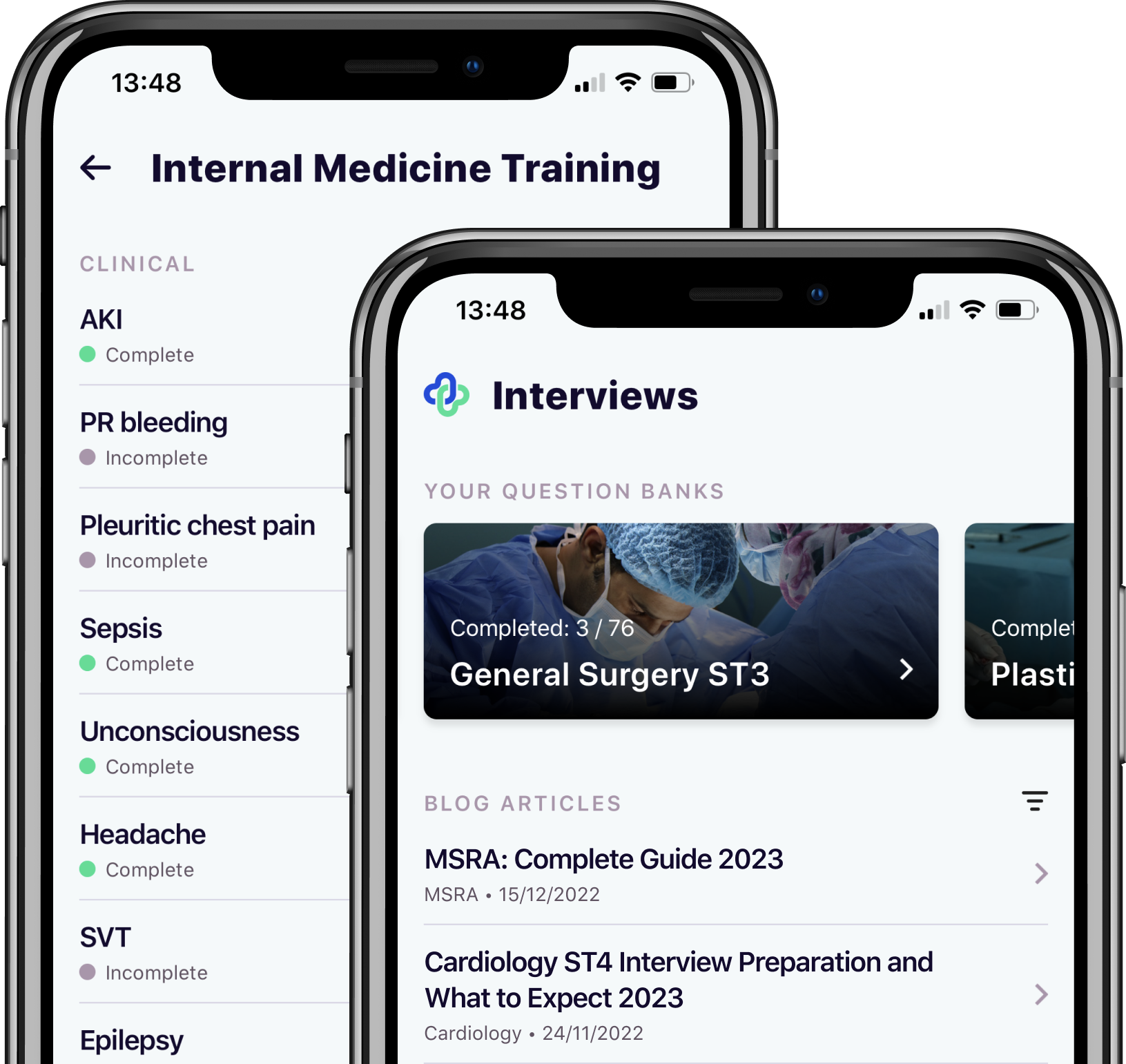
GP Stage 3 Interview Simulated Clinical Scenario Preparation
Please note: This is historical information about the GP selection centre interview and is for reference only. Applicants are no longer required to attend an interview. Instead, your ranking is based solely on your MSRA score.
Take your MSRA revision to the next level with our artificial intelligence powered, adaptive question bank
Our state of the art algorithms will help you progress faster than ever.
The Simulated Clinical Scenario section of the GP Stage 3 interview comprises of three, ten-minute stations examined in isolation, with a short rest break between each. It can be the most daunting aspect of the GP recruitment process! Present in each station is one trained actor who is taking on the role of either the patient, relative or carer, or non-medical colleague. There are also one or two trained examiners who are either doctors, educational psychologists or allied health professionals such as GP practice managers. You do not receive any information prior to entering the room. Instead the scenario is available on a piece of paper in the station and reading time is included within the ten minutes, therefore, it’s important to read the scenario as quickly and accurately as possible so as not to lose too much consulting time. To help prepare you for this station we’ve developed the GP Stage 3 Interview Question Bank.
Often the chairs have been arranged within the room so that your back is facing the examiner. This is done deliberately and it is best to start by repositioning the chair so that your face is visible to both the patient and the examiner. It is hard for the examiner to assess empathy and non-verbal communication skills if they are unable to see you. It is important to introduce yourself to the patient according to your role that is stated in the scenario.
The examiner’s focus is not on your practical clinical skills or knowledge but on your ability to listen, ask questions and address the concerns of the person you are talking to. This highlights a key difference between hospital and general practice medicine. Your responses should be tailored to the situation and person in front of you rather than sticking to a formulaic history. Many people fail to prepare for this section of the interview and drop marks, however the simulated scenarios are a key part of your GP application.
Consultation Skills
The actors are given instructions detailing what to say and how to behave, including their body language, emotional state and appearance. They may only reveal information if a question is asked in a certain way or if a good rapport is established with the candidate. It is therefore important to listen to what they say carefully and pick up on any verbal or non-verbal cues. The actor may also provide feedback on aspects of your performance to the examiner such as how you made them feel.
Active Listening
Often during consultations candidates are so busy thinking about what question they should ask next they do not truly listen to what the patient is saying. In fact, if the patient is allowed to talk they will often tell you all the information that you need to know, they just require a little steering along the way. Listening is essential to picking up verbal queues and hints that will unlock a new level of detail within the patient’s story and score you high marks. For example; ‘Usually I would have come to the doctor before now but I’ve had a lot of things on my mind.’ It is important to ask what these things are as this will make the patient feel that you are listening and genuinely concerned about their problem whilst facilitating a holistic approach.
Empathy
A key way of showing empathy is through non-verbal means. This may include nodding of the head, an open posture, appropriate facial expressions relating to what the patient is communicating i.e. a smile or a frown, and where appropriate the use of silence. Try to avoid the use of stock phrases and instead respond to the patient’s specific concern and reflect their thoughts and feelings.
Open Questions
As taught in medical school open questions are the most effective way of gathering information. Often it can take a minimum of 2-3 open questions to get a good understanding of the patient’s problem. An opening statement as simple as, ‘How can I help today?’ can be enough to gain a good basis for the consultation. This can then be followed by a further general question such as, ‘Can you tell me a bit more about that?’. The use of reflection can also be helpful at this stage and reassure the patient that you are listening to their story. Simply saying, ‘You mentioned before that…’ is an effective way of achieving this.
ICE – Ideas, Concerns, Expectations
Often in stressful situations it is useful to have a structure to fall back on in moments of panic and ICE provides this. Used most affectively towards the latter half of a consultation it can help to further reveal a patient’s or colleague’s motivation. Examples of how this can be used are provided below:
- You have had this pain for some time now, I wondered have you had any thoughts as to what might be causing it? ( I )
- You mentioned before that you had read about your symptoms online, is there anything else that has caused you to worry? ( C )
- Do you have any particular hopes of what you wanted to happen following our consultation today? ( E )
Historically the simulated clinical scenario stations are marked according to the candidate’s performance in four main areas; empathy and sensitivity, communication skills, professional integrity and conceptual thinking and problem solving. Armed with the consultation skills outlined above and a good understanding of the personal specification, you are on the right path to score highly within these four areas and do yourself justice in this component of the selection centre!

Take your subscriptions with you
Our mobile app allows you to access your interview and exam question banks wherever you are.





